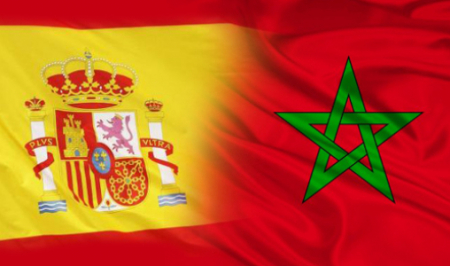Revival of Moroccan-Spanish Relations, Realization of Dream of Both Countries for Economic Integration – Op-ed –
Morocco and Spain have a “complex, multifaceted relationship, guided by geography, history, common present, and inevitably the future which is governed by the need for coexistence and cohabitation in a vast space considered as one of the most sensitive areas in terms of geostrategy,” underlined the Arab-speaking newspaper ”Asharq Al-Awsat”. The newspaper stressed in an op-ed by Lahcen Haddad, member of the House of Advisors, that the destiny of Spain and Morocco is to share not only a long and rich history of mutual concessions but also borders on two seas and a common view on the Strait of Gibraltar, the most important marine area in the world, known for its tireless activity of trade and navigation. The author of the article noted that anyone who reads the history of relations between Morocco and Spain, over a period of at least thirteen centuries, is fascinated by the various events, battles, wars, conquests, colonialism, liberation and economic, social and cultural interaction, adding that the liberation of Spain from the grip of fascism after the death of General Francisco Franco in 1975 and the liberation of Morocco from the domination of colonial powers from 1956 to 1975, were a turning point in the history of the two countries and in the history of their relations. Over the past forty years, relations have developed and Spain has become the first trading partner of Morocco while Morocco has become the first trading partner of Spain in Africa, Haddad pointed out, adding that trade between the two countries amounts to 16 billion euros, while the number of Spanish companies operating in Morocco is estimated at more than a thousand. The value of Moroccan tourism in Spain is one billion euros, while that of Spanish tourism in Morocco is nearly one billion and two hundred million euros, according to the newspaper. The transit operation of about three million Moroccans residing abroad via Spanish territory to enter Morocco during the summer season brings about one billion euros to the Spanish economy, while some 700,000 Moroccans living in Spain contribute to building the Spanish economy and transfer much of their incomes to their families in Morocco, according to the same source. At the security level, Haddad stressed that dozens of terrorist cells have been dismantled in Spain and Morocco, thanks to the exemplary cooperation between the security services of both countries, adding that the exchange of information, joint operations and cooperation with security services of European, American, Arab and African countries, has become a model to follow in the fight against terrorism, extremism, organized crime and cross-border crime, while the number of aborted immigration attempts by the Moroccan security services has reached tens of thousands. The leaks recorded in the field of migration here and there should not obscure the efforts made by Morocco, which cost him annually about half a billion euros to protect its borders and the borders of the European Union against illegal immigration, Haddad underlined. According to the author of the article, “there are those who want to tell another story, a narrative of a different and alternative kind. It is the Podemos, the extreme left which supports the separatist thesis of the Polisario Front, and some leftist journalists”, noting that the announcement made by the President of the Spanish government Pedro Sanchez that the Moroccan proposal on autonomy is the most serious, realistic and credible basis to settle the Sahara conflict, has dealt a severe blow to this story. Haddad stressed that the response has been violent on the part of the opponents of the Moroccan-Spanish rapprochement, because they “see in the reality of the Spanish position a weakening of their theses, especially since they are betting on the continuation of tensions between the two countries, because, according to them, this tension will bring Spain closer to Algeria and accelerate the dream of an independent state in the Moroccan Sahara”. The Spanish State, with its traditional political components, its security and military apparatus, the economic class and the local governments, considers the revitalization of strategic relations not only as an investment in the future, in the security of the Europe and in the prosperity of Sebta and Melilla (the two occupied Moroccan cities), the Canary Islands, Andalusia and others, but also as a sign of fidelity to the destiny of History and the authority of geography in the realization of the Hispano-Moroccan dream of creating a vast area of economic integration and cooperation in matters of security and joint development of the maritime domains and natural resources of the two countries, Haddad concluded.

